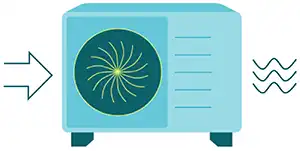How to Make Your Off-Grid Home More Energy Efficient
In a world where environmental consciousness is more critical than ever, making eco-friendly choices at home can have a significant impact on both our planet’s health and your bank account.
Whether you’re a seasoned eco-warrior or just beginning your quest to make small changes in your home, you’re in the right place. This blog is your one-stop resource for learning about the ways you can minimise your energy usage, cut down on utility bills, and reduce your carbon footprint, all while enjoying the comforts of a cosy and efficient living space.
Read on to discover some easy ways to reduce the amount of energy you use, and save some money on your energy bills.
Save Energy When Cooking with Kitchen Appliances
Appliances such as air fryers and slow cookers have revolutionised meal preparation for households across the UK. The question is, how energy efficient are these appliances compared to an oven?
Many homes across the nation typically have either an electric or gas oven already installed in their kitchen. This has resulted in the oven being the standard go-to device for cooking food. The question stands, are slow cookers and air fryers energy efficient?
You may be surprised to learn that the average electric oven consumes between 2,000-2,200 watts of energy per hour, whereas air fryers use around 800 watts and slow cookers use only around 120-150 watts.
Despite this, in our recent survey, we found that while 28% of survey takers use their oven around 2-3 times per week, just 12% use their air fryer and only 3% regularly use their slow cooker.
Though both slow cookers and air fryers are considerably more efficient than ovens, they differ slightly in their uses:
Slow Cookers VS Air Fryers
Slow cookers lend themselves to the batch cooking process and can be a great way to meal prep food for a few days of the week. Meal prepping helps you save even more energy than cooking day-to-day. Instead of using your hob or oven multiple times per week to cook individual meals, prepare large quantities of food in the slow cooker and then refrigerate for future meals.
With a long cooking time, slow cookers gradually cook your food throughout the day, giving you the luxury of coming home after a long day of work to a steaming hot meal ready to eat.
Air fryers, on the other hand, are a great option to make quick meals that will feed just one or two people. Typically smaller in size, air fryers are the perfect option for a quick teatime meal. Air fryers provide a healthier alternative to deep frying and due to the constant convection of air, they ensure that your food retains its delicious crispiness. You could even use an air fryer to heat up meals that have been meal-prepped in a slow cooker, before eating.
By making the simple switch from oven to slow cooker or air fryer where possible, you could reduce your food preparation costs by up to 90%.
How to Save Money on Your Central Heating.
Using central heating efficiently can help you save money on your energy bills while keeping your home warm and comfortable. Here are some tips to help you save money when using your central heating.
Choose Which Rooms to Heat.
If your heating system allows, consider only heating the rooms that need it. This is particularly helpful for those who work from home in the winter. When turning on your heating, ensure the radiators are turned off in each room that is not in use, so you’re not using energy needlessly.
Keep Your Boiler Well Maintained.
Ensure your central heating system is well-maintained and operating at optimum efficiency. This includes cleaning or replacing air filters, checking for leaks, and scheduling annual professional inspections. A well-maintained system operates more efficiently and can ultimately save you money.
Here at Certas Energy, we offer a variety of boiler care plans to help give you peace of mind – visit this page for more information.

Draught-proof your home.
Identify any ‘problem areas’ in your home that may be letting in the cold air. Inspect your doors and windows for drafts and seal any gaps with weatherstripping or caulk. You could also buy or make a homemade draught excluder to keep under your door. Rugs are also a great way to stop cold air from sneaking through your floorboards. A well-insulated home retains heat better, reducing the need for constant heating.
Make Your Home More Cosy.
Adding warmth to your home doesn’t only need to come from your thermostat! Creating a warm and cosy atmosphere through decor choices can make your space feel inviting, comfortable and warm enough to turn your thermostat down.
Decor choices can significantly impact the comfort and well-being of the people living in your home. A warm and inviting atmosphere can have a positive psychological effect, making your family feel more relaxed, content, and at ease. By incorporating warmer tones of ambient LED bulbs, your home will exude comfort and warmth. These bulbs are a perfect energy-efficient lighting option. Candles are also a great light source, creating an atmosphere of cosiness while emitting actual heat at the same time.
Choose warm, earthy tones for your walls, furniture, and decor. Colours like warm browns, deep reds, soft oranges, and muted yellows can create a cosy ambience. You can also incorporate some neutral colours to balance the palette and brighten the room.
Cosy items can also serve a functional purpose to increase the temperature of your home. Heavy curtains, rugs and plenty of soft furnishings such as blankets and throws add a deeper level of comfort and warmth both visually and physically.
Energy Saving Tips for Using Your Washing Machine
Almost 50% of our recent survey takers told us that they use their washing machine around 2-3 times per week on average, making them one of the most used items in their household. Depending on the make, model, size and washing habits, your washing machine could be one of the biggest energy consumers in your home.
Washing machines typically come with an EPC energy efficiency rating to give you a rough idea of how much energy they will be consuming.
Regardless of the EPC rating, there are some simple ways that you can reduce your washing machine’s energy consumption and ultimately its running costs.
Tip 1: Know How Much Your Washing Machine Can Hold.
Washing machines can hold varying amounts of laundry depending on the model type, therefore it’s important to be aware of roughly how many clothes can be put in the machine for a maximum load as you may be over or under-filling your machine on each wash.
Place a basket on your bathroom scales and fill it with your dirty laundry until it reaches the maximum weight that the machine can hold to ensure you’re making the most of each wash. If possible, try to wait until you have a full load each time before putting your washing on. Ensuring that you have a full load means fewer washes are required overall and you are consuming less energy and water.
Tip 2: Wash At a Cooler Temperature
A common misconception is that washing your clothing at the maximum temperature is the only way to get your clothes completely clean. It is now common for brands to offer a cold-wash detergent that allows you to wash your clothes at a low 30 degrees. Using specialised detergent will still remove most stains at 30 degrees while allowing you to use 40% less energy and ultimately reduce your annual energy bill.
Tip 3: Only Use Your Washing Machine and Dryer When Necessary
While it might be tempting to throw your clothes in the wash after just one wear, consider whether items such as jumpers, jeans and jackets actually need to be washed so frequently. Rewearing items can save you from putting on unnecessary washing loads reducing the yearly cost to run.
During the warmer summer months when clothes may need to be washed more frequently due to sweat and outdoor activities, you can still reduce your energy output by air drying clothes rather than using your tumble dryer.
Give it a Go Yourself!
While it may seem daunting at first, even the smallest habit changes can make a huge difference.
Start small and you will be well on your way to making an impact.
Take a look at some of our other blogs for more information on making your home more energy efficient.




